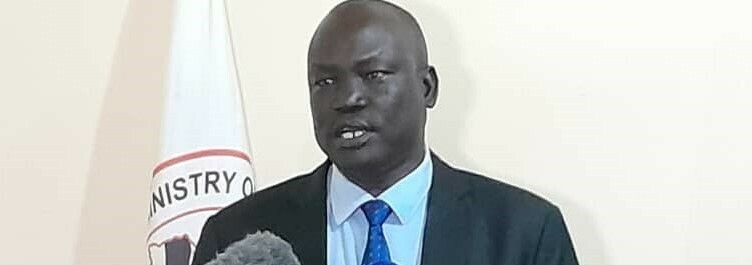The Ministry of Humanitarian Affairs says it seeks more funding to respond to the influx of returnees and refugees fleeing the conflict in Sudan.
Addressing a press conference in Juba on Thursday, the Minister of Humanitarian Affairs and Disaster Management, Albino Akol Atak, said they are already experiencing funding gaps as the number of returnees increases on a daily basis.
Akol said South Sudan has so far received 175,000 returnees who fled the conflict in Sudan that the ministry anticipates the number of returnees to reach 500,000 people as the conflict in Sudan continues.
“There are funding gaps. The government has already put in some money to respond to the crisis as well as the international community has also put in some money. Despite that efforts, we still have some gaps in funding because of the big number that are arriving every day,” he said. “They are congesting in some entry points, mostly in Renk, Paloch and Malakal. So we should go further in mobilizing more resources from the government side and from the international community.”
Akol noted that the South Sudan government is considering revising its plans for settling the returnees as the conflict in Sudan continues.
“We have created transit sites but because the returnees and asylum seekers come in big numbers and the transportation is low, we have a lot of congestion in those areas and those areas were meant for transit sites, but now are almost turning to be permanent sites which are against our plan,” he said.
“We need to revise the three months that we have been implementing to get a new plan that will go for the end of the year that we are anticipating that 500,000 and more people will arrive up to the end of the year because we are seeing the conflict in Sudan is not stopping very soon,” he added.
For his part, the Acting Humanitarian Coordinator for South Sudan, Peter Van der Auweraert, said South Sudan will face a lot of difficulties in responding to the humanitarian crisis as a result of the Sudan conflict.
He said transportation for the returnees is a challenge in South Sudan as 75 percent of people arrive in Renk and can only be transported by boats or by planes, which he said is very expensive.
“When people arrive South Sudan today, they are more vulnerable than they used to be, they are more likely to be undernourished, they are more likely to be sick and they are more likely to need more assistance than before,” he said.
Fighting erupted in neighbouring Sudan in mid-April 2023 between the Sudanese Armed Forces and Rapid Support Forces. The conflict has displaced thousands within Sudan and forced thousands more to flee to South Sudan.




